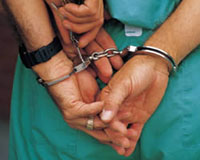| . |  |
. |
Washington (AFP) June 11, 2009 The US envoy on North Korea voiced hope Thursday for a diplomatic solution with the communist state and predicted it would eventually return to the table despite an escalating nuclear showdown. Special envoy Stephen Bosworth said the United States was committed to diplomacy even as the UN Security Council moved to expand sanctions on impoverished North Korea over its nuclear test last month. Bosworth told a Senate hearing that the United States was using a variety of tools with North Korea, ranging from sanctions to diplomatic engagement -- "if North Korea shows seriousness of purpose." "The United States and our allies and partners in the region will need to take the necessary steps to assure our security in the face of this growing threat," Bosworth told the Senate Foreign Relations Committee. But he added: "In the interest of all concerned, we very much hope that North Korea will choose the path of diplomacy rather than confrontation," he said. He said the United States had no hostility toward North Korea -- as is frequently charged by Pyongyang to justify building its "nuclear deterrent." "As we have stated repeatedly, the United States has no hostile intent toward the people of North Korea nor are we threatening to change the North Korean regime through force," he said. Bosworth said the ultimate goal of President Barack Obama's administration was the "verifiable denuclearization" of North Korea. He renewed US insistence not to recognize Pyongyang as a nuclear weapons state. North Korea last month tested a nuclear bomb, heightening a showdown after in April testing a long-range missile and withdrawing from a US-backed six-nation denuclearization deal. But Bosworth said he was hopeful for a resumption of the six-party talks, which involved China, Japan, the two Koreas, Russia and the United States. "There is no evidence they are prepared to do that now but I believe they will eventually come back to the table," Bosworth said. Bosworth said the United States eventually hoped to negotiate denuclearization measures with North Korea that are "more irreversible," saying that previous agreements were too easy to undo. Former president George W. Bush had held out hope into his last days of office for a breakthrough with Pyongyang. Despite criticism from Japan some conservatives in his Republican Party, Bush removed North Korea from a list of state sponsors of terrorism, a longtime demand of Pyongyang because it paves the way for US aid and loans from multilateral lenders. Bosworth hinted that the Obama administration was not looking to put North Korea back on the list. "The secretary of state is only authorized to make a designation based on a determination that the government of a given country has repeatedly provided support for acts of international terrorism," Bosworth said. "Now, I can say, unequivocally, we will follow the provisions of that law completely," he said. He was facing questions from Republican Senator Jim DeMint, who said that putting North Korea back on the list was one of the few ways to pressure it. "It makes absolutely no sense to continue with this, and I think it basically amplifies a growing sense that Americans are a paper tiger, full of talk and no action," DeMint said. Share This Article With Planet Earth
Related Links Learn about nuclear weapons doctrine and defense at SpaceWar.com Learn about missile defense at SpaceWar.com All about missiles at SpaceWar.com Learn about the Superpowers of the 21st Century at SpaceWar.com
 US should move quickly to free journalists in NKorea: expert
US should move quickly to free journalists in NKorea: expertSeoul (AFP) June 9, 2009 The United States should move quickly to negotiate the release of two American journalists sentenced to 12 years' imprisonment in North Korea, a South Korean expert said Tuesday. The North's Central Court Monday sentenced TV reporters Laura Ling and Euna Lee to "reform through labour" for what state media called an illegal border crossing and an unspecified "grave crime." Under the ... read more |
|
| The content herein, unless otherwise known to be public domain, are Copyright 1995-2009 - SpaceDaily. AFP and UPI Wire Stories are copyright Agence France-Presse and United Press International. ESA Portal Reports are copyright European Space Agency. All NASA sourced material is public domain. Additional copyrights may apply in whole or part to other bona fide parties. Advertising does not imply endorsement,agreement or approval of any opinions, statements or information provided by SpaceDaily on any Web page published or hosted by SpaceDaily. Privacy Statement |